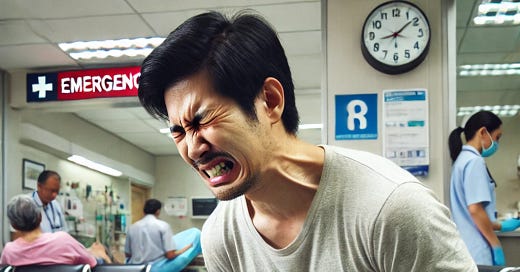It began as a whisper, a subtle twinge in my back that came and went like a phantom in the night. Easy enough to dismiss, probably just the price of parenthood, I thought, lifting our little one throughout the day. How naive I was, how blissfully unaware of the storm gathering within my body.
The following afternoon painted a different picture entirely. As I sat at my desk, stealing a precious moment of quiet while the baby napped, it struck. Not a whisper this time, but a scream, a knife of pain so sharp and sudden it took my breath away. The kind of pain that makes you question everything you thought you knew about your body's capacity for suffering.
"I just need something for this," I remember thinking, clinging to the comforting delusion that an ordinary painkiller could tame this beast. But as minutes stretched into hours, the pain grew more insistent, more demanding, until it consumed every corner of my consciousness. Finally, I surrendered to reality and called my wife.
She arrived armed with Tums, still believing we were dealing with mere heartburn. One look at my face, contorted in agony, sweat beading on my forehead, and her expression shifted from concern to alarm. "Spencer, this isn't normal. We're going to the ER." I couldn't even muster the energy to argue. The pain had become my whole world, a universe of hurt that left no room for protest.
The emergency room was a tableau of human suffering: the usual mix of worried faces and minor emergencies. But among the crowd, I stood out like a wounded animal, unable to contain my groans and whimpers. Pain strips away dignity and leaves you raw and vulnerable. I didn't care who saw or heard; I just wanted relief.
Mercy came in the form of a hallway bed near the nursing station, not exactly the private room of my fantasies, but a haven nonetheless. The doctor who appeared seemed haloed in my pain-addled vision, his calm demeanor a stark contrast to my internal chaos. His gentle examination and methodical questions led to two revelations: first, blessed pain relief was coming, and second, we were likely dealing with a kidney stone.
The words "kidney stone" sent my mind spinning into overdrive. Even in my state, I found myself reaching for my phone, frantically consulting ChatGPT about diet changes and what lay ahead. The future suddenly seemed full of warning signs and dietary restrictions.
Then came the nurse with her promised injection. When I instinctively offered my arm, her correction, "Oh no! This will go into your deltoid." She sparked an oddly lucid moment of irritation. Even in agony, I wanted to challenge her assumption about my anatomical knowledge. But all such thoughts evaporated as the medication took hold.
The transformation was nothing short of miraculous. From limping into the CT scan room to walking out freely, I experienced firsthand the seductive power of opioid painkillers. The relief was so complete, so intoxicating, that I understood with crystal clarity how people become addicted. It wasn't just the absence of pain, it was liberation.
In the waiting area, an unexpected moment of connection emerged. An elderly man, noticing my improved state, asked about my diagnosis. When I mentioned kidney stones, his face softened with genuine empathy. Pain, it seems, is a universal language, and those who have spoken it fluently never forget its dialect.
The final verdict on the result of the scan came after what felt like hours: a small stone, passable with sufficient hydration and the help of FloMax. My wife, ever practical, insisted on a follow-up with a urologist, a prospect that filled me with a different kind of dread. The thought of awkward questions and even more awkward examinations loomed in my future.
Looking back, the signs were all there. My diet had been a parade of poor choices – fast food laden with sodium, Christmas chocolates that somehow never disappeared, and my eternal weakness: chips. It's remarkable how clear everything becomes in hindsight, and how obvious the connection between choices and consequences.
They say near-death experiences change people. While my kidney stone wasn't life-threatening, it certainly felt like a close encounter with mortality. The pain was my body's way of staging an intervention, demanding better choices and more mindful living. For those fortunate enough to never have experienced this particular brand of agony, imagine the worst pain you've felt, then multiply it by a factor of unimaginable.
I often wonder about those who face this ordeal alone, without a partner to drive them to the hospital or advocate for their care. My experience, as terrible as it was, came with the buffer of support and access to immediate medical attention. Others might not be so fortunate.
This wasn't just a medical episode; it was a wake-up call delivered with all the subtlety of a sledgehammer. The body can be remarkably patient with our misdeeds, but when it finally demands attention, it does so with unmistakable clarity. As I write this, those Christmas chocolates still sit in their bowl, but they've lost their appeal. Sometimes, the most effective dietary changes come not from willpower, but from the vivid memory of consequences.




